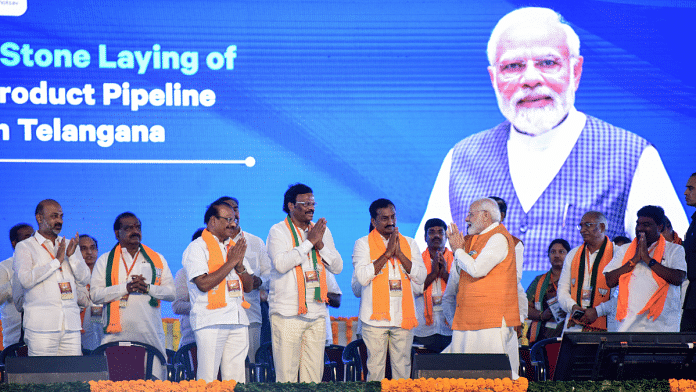Hyderabad: After walking barefoot for almost 12 years — a period known as a “pushkaram“ in Telugu — Muthyala Manohar Reddy finally put on a new pair of slippers Sunday evening. The 71-year-old had taken a vow on 4 November 2011 that he would not wear any footwear until a ‘National Turmeric Board (NTB)’ was established in Telangana — the largest producer of turmeric in India.
His long-awaited wish came true Sunday, when Prime Minister Narendra Modi announced at a public rally in Mahbubnagar, Telangana, that his government had decided to form the board. Though the PM did not reveal the location of the board, he hinted that it would be in Telangana, which is going to the polls in two months.
The indication was enough for Telangana’s turmeric farmers and BJP workers to break into a celebration — they burst crackers, distributed sweets and bought a new pair of slippers for Reddy.

The PM is expected to give more details about the board when he visits Nizamabad — one of the hubs of turmeric farming in the state — Tuesday.
The NTB and other promises the Modi government is likely to make before the polls, political analysts said, would give the BJP some confidence to take on the state’s ruling Bharat Rashtra Samithi (BRS), especially in the 2024 Lok Sabha polls.
The party had won four Lok Sabha seats in the state in 2019, of which two are influenced by the vote of turmeric farmers — Nizamabad and Adilabad.
“With NTB, the BJP can go to voters showing it as its commitment to fulfil promises. Although [set up] for electoral gains, the NTB will do good for Telangana farmers,” said senior political analyst Bhandaru Srinivasa Rao, recalling the agitation for a Tobacco Board in Guntur, Andhra Pradesh, and its constitution in 1976.
Echoing Rao, Reddy said “the board will help farmers get better pricing for the crop”.
Speaking to ThePrint, he said, “Nizamabad turmeric is considered to be top quality, used in medicine production too. But the crop prices fluctuate as there is no guaranteed amount, a minimum support price. We are getting between Rs 5,000 and Rs 6,000 per quintal, which most times does not cover our costs. The board will help us get a remunerative price for our produce.”
Why do the farmers want the board?
India is the largest producer, consumer and exporter of turmeric, one of the most popular household spices, contributing about 80 percent of the world’s yield.
Telangana is the largest producer in India (taking average yields statewise over the past five years), followed by Maharashtra, of turmeric — scientifically known as Curcuma longa — according to reports by the Spices Board of India (a body under Ministry of Commerce) and the Ministry of Agriculture and Farmers Welfare.
Nizamabad, Jagtial, Nirmal, Warangal and Mahabubabad are among the top districts in turmeric production, contributing 90 percent of the state’s output, a 2018-19 report by the Telangana horticulture department said.
Turmeric, which was sown over 53,565 hectares in the state in the 2018-19 season, is known as “yellow gold” for its high value and demand, and farmers in these areas cultivate it even if they only have a small patch of land available.
However, according to a 2017 Ministry of Agriculture and Farmers Welfare 2017 report on turmeric farming in Telangana, “in recent times, the yield prices have not been encouraging and are well below the heady highs”.
As a result, the region’s farmers say, many are moving away from turmeric cultivation.
The farmers harvest their crop in February and sell it at Nizamabad or Sangli markets in Maharashtra. Some farmers choose to store the crop in cold-storage units, which right now is fetching Rs 13,000 per quintal in market, “an unusually good price”, according to Reddy and Ganga Reddy, a farmer from Manmad village, Nirmal district.
However, many farmers cannot afford to pay for storage, while others complain the returns aren’t always that high. “I had stored about 150 quintals three years ago, but when I sold them, I got less money than the expenses incurred (cultivation, storage),” said Ganga Reddy.
“NTB, we believe, will also bring several incentives, advanced technical support, giving a fillip to turmeric growth in Telangana and elsewhere in the country,” Ganga Reddy added.
The demand for NTB has been a popular movement in north Telangana districts for the last two decades, especially in the Nizamabad-Nirmal belt, with which Reddy has been associated since 2006.
“As a person taking the lead in the movement, I even left the BJP so as to garner support across political affiliations,” said Reddy, who is a former sarpanch of a village in Nizamabad district.
How did NTB demand affect elections?
National Turmeric Board has not only been a long-standing demand but has also influenced election results in Telangana. In the 2019 Lok Sabha elections, when the then MP Kalvakuntla Kavitha, the daughter of Chief Minister K. Chandrashekar Rao, lost her Nizamabad constituency, it was majorly attributed to farmer indignation.
As many as 178 farmers reportedly stood in the Lok Sabha fray contesting against Kavitha to highlight their demands for minimum support price, state procurement of red jowar (sorghum), and constitution of turmeric board.
Kavitha lost to the BJP’s Dharmapuri Arvind, who had given a bond/stamp paper assurance to the farmers that he would bring the NTB to Nizamabad. However, the Modi government was non-committal on its MP’s promise even as late as March this year.
Replying to a BRS MP’s question in the Lok Sabha on the promised turmeric board at Nizamabad in March, Union Minister of State for Commerce and Industry Anupriya Patel ruled out any such move and said, “The Spices Board, a statutory autonomous body, set up under the Spices Board Act, 1986 is entrusted with the responsibility of promoting 52 spices, including turmeric, coriander and chillies.”
However, as Arvind faces criticism from his voters over the delayed promise and Kavitha vows to defeat him in 2024, the PM’s announcement came as a relief for the BJP MP and the state unit.
(Edited by Richa Mishra)
Also Read: Telangana is the success story of Indian agritech. AI tools, soil testing, e-commerce & more



